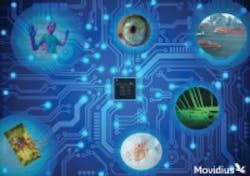Google and Movidius partner to accelerate machine learning in mobile devices
Movidius, a company that develops low-power, visual intelligence for connected devices, is partnering with Google to accelerate the adoption of deep learning within mobile devices.
MORE ARTICLES
Google introduces Cloud Vision API for image processing
Google puts focus on machine vision
Google and Ford rumored to be collaborating on self-driving cars
Along with the Movidius’ vision processor platform, Google will source the entire Movidius software development environment, and in turn, Google will contribute to Movidius' neural network technology roadmap.
"What Google has been able to achieve with neural networks is providing us with the building blocks for machine intelligence, laying the groundwork for the next decade of how technology will enhance the way people interact with the world," said Blaise Agüera y Arcas, head of Google's machine intelligence group in Seattle. "By working with Movidius, we're able to expand this technology beyond the data center and out into the real world, giving people the benefits of machine intelligence on their personal devices."
Google will deploy its advanced neural computation engine on the Movidius MA2450 chip, which is able to perform complex neural network computations in an ultra-compact form factor, thus introducing a new way for machine intelligence to run locally on devices. Future products, according to Movidius, will have the ability to understand images and audio with incredible speed and accuracy, offering a more personal and contextualized computing experience.
Remi El-Ouazzane, CEO, Movidius, commented on the collaboration: "The technological advances Google has made in machine intelligence and neural networks are astounding," he said. "The challenge in embedding this technology into consumer devices boils down to the need for extreme power efficiency, and this is where a deep synthesis between the underlying hardware architecture and the neural compute comes in."
He added, “Movidius' mission is to bring visual intelligence to devices so that they can understand the world in a more natural way. This partnership with Google will allow us to accelerate that vision in a tangible way."
This isn’t the first time the two companies have collaborated. Movidius also worked with Google on its Project Tango 3D sensing platform, having provided the Myriad 1 computer vision processor to help process data for the handheld device.
View more information on Movidius.
Share your vision-related news by contacting James Carroll, Senior Web Editor, Vision Systems Design
To receive news like this in your inbox, click here.
Join our LinkedIn group | Like us on Facebook | Follow us on Twitter
About the Author

James Carroll
Former VSD Editor James Carroll joined the team 2013. Carroll covered machine vision and imaging from numerous angles, including application stories, industry news, market updates, and new products. In addition to writing and editing articles, Carroll managed the Innovators Awards program and webcasts.
